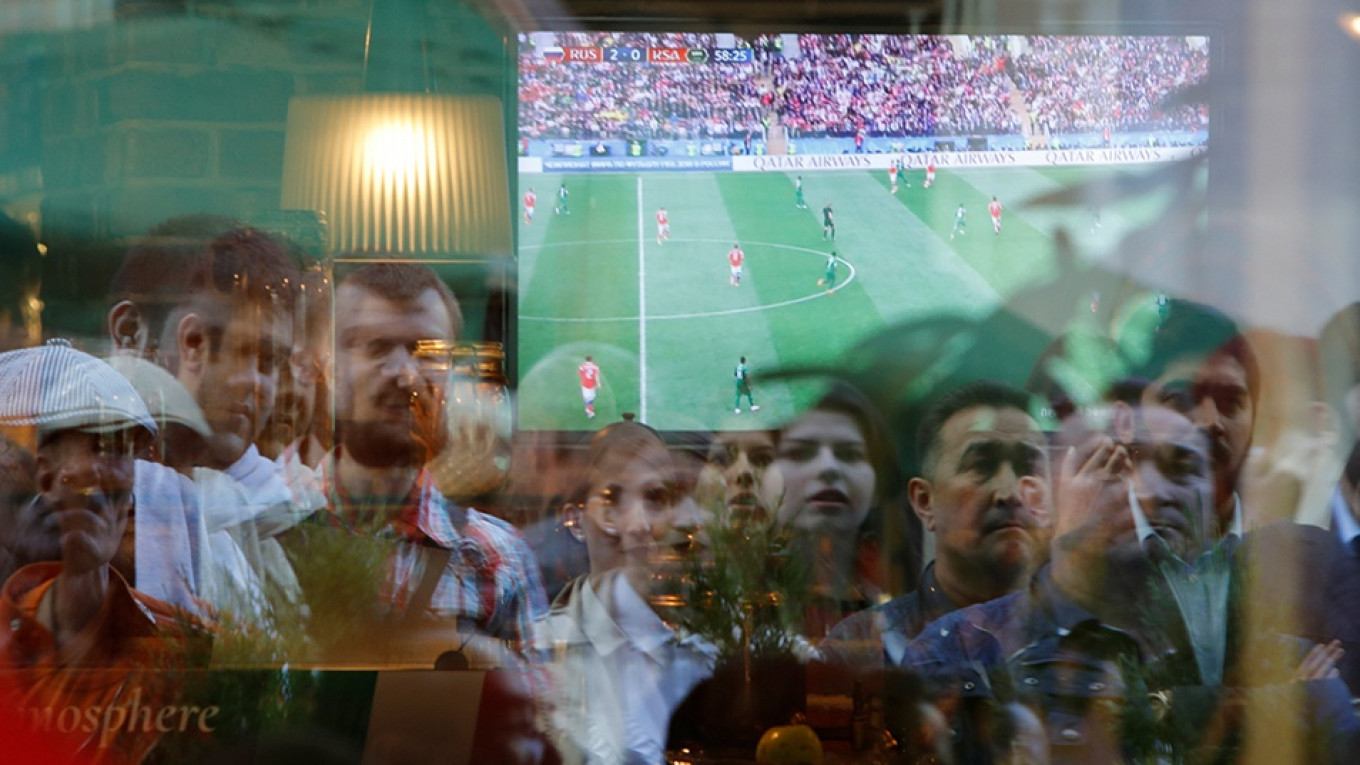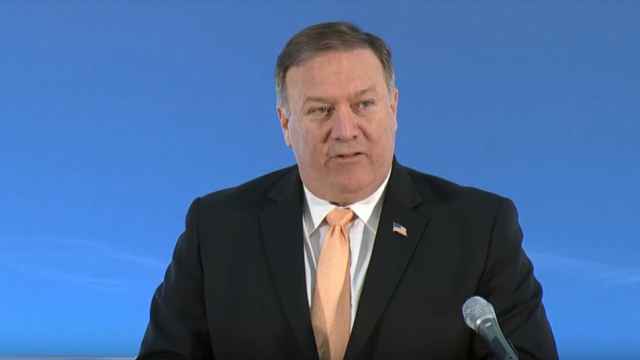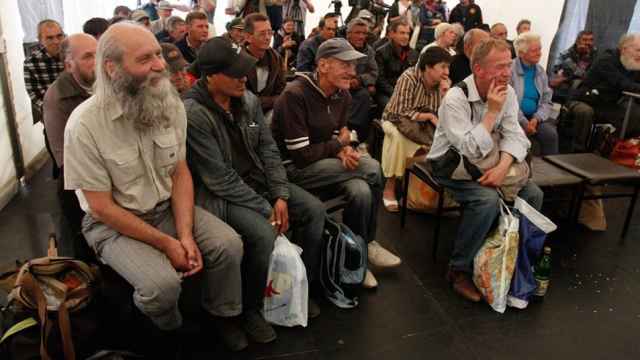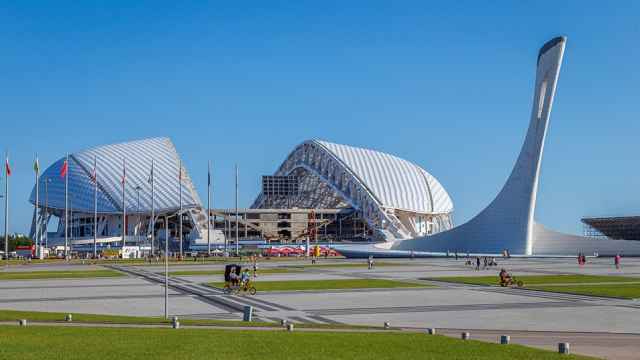Before the World Cup kicked off earlier this month, Russians were, to say the least, pessimistic about their team’s chances.
Not only was Russia the lowest-ranked team, the hosts had gone without a win in seven matches. After the final match in that streak beginning October 2017, a state television commentator summed up the mood. “What a pity,” he said, “that when we are finally hosting the World Cup, we will be represented by the worst Russian national team ever.”
That mood, however, changed drastically in just a few days. After the host team pummeled Saudi Arabia 5-0 and then Egypt 3-1, it secured its first ever qualification into the World Cup knockout rounds. And all that before even playing its final group stage match against Uruguay on Monday. Now, home supporters have new-found belief.
What may come as a surprise, though, is that despite all the pre-tournament pessimism, Russians putting money on the matches believed in their team from the outset. According to Alexander Yegorov, deputy general director of one of the country’s largest bookmakers, Liga Stavok, 90 percent of bettors who put money on Russia’s result in the group stages bet they would progress.
Even more surprisingly, Russia has consistently been one of the top five favorites to win the tournament since Liga Stavok, which has upwards of 500 locations in 97 cities, opened betting on the World Cup.
“There are a several factors that explain this,” Yegorov said. “One is that with the odds at 75 to 1 before the tournament, and only down to 45 to 1 now, the payout would be huge if Russia did somehow win. Another is that people also just really like supporting their own team with their bets.”
“I see it as a question of solidarity,” explained Igor, 56, one of the 90 percent to wager Russia would make it to the knockout rounds. As he watched Brazil play Costa Rica at one of Liga Stavok’s locations in central Moscow on Friday afternoon, Igor said that although he had had his doubts about the Russian football team’s quality, he knew he would back the players at the bookmakers. “For me, it was about national pride.”
That afternoon, about 50 men were in the Liga Stavok betting shop. While all the large screens were playing the ongoing World Cup match, many patrons also tuned into other sports: Russian table tennis, international volleyball, the Thai professional football league, Australian rules football.
“Typically I come to try to make money, so I play the odds in various sports,” explained Eldar, a 25-year-old construction worker who had stopped in during his lunch break. “But with the World Cup I’ve been betting for fun: It makes the games more interesting.”
Eldar was tense as he spoke: His eyes never left the screen in front of him showing the Brazil-Costa Rica match. He had put 5,000 rubles ($80) on Brazil to win, and the teams were still at a deadlock with 10 minutes to go.
Dylan Cox, an 18-year-old Russian-American, also had put his money on Brazil. A student, he had just finished a year studying abroad in Moscow and was killing time before heading back to the United States after the World Cup. Like Eldar, he said he sometimes bets simply to raise the stakes for himself while watching a match.
“I’ve got tickets to see Russia, if they finish in second place, in the round of 16,” Cox said. “I’ll definitely be betting on Russia that match.”
Despite Russia’s recent form and his intention to bet on them regardless, Cox was doubtful of the host’s chances. Against Uruguay in their final group stage game, Cox said Russia will lose. And regardless of whether Russia comes out of the group in first or second place, he notes it will probably then face Spain or Portugal, two of the tournament favorites. Russians’ optimism, Cox concluded, might be driven by emotions.
“Before the tournament, I remember seeing on social media how everybody was saying that we would embarrass ourselves,” he said. “Now everyone’s saying we’ll make it to the semis or even the final. It’s kind of crazy.”
Others were baffled not just by Russia’s results, but by the entire tournament. Brazil, a tournament favorite, had just scored in the final few minutes as time was running out to barely squeak by Costa Rica. While most of the men in the shop erupted into cheers, Andrei Volkov, 40, was holding his head in his hands.
“Nothing in this tournament makes any sense,” he said. “Brazil is barely getting by, Germany looks mediocre, Argentina looks terrible, Russia is winning. I just don’t think I can bet on any more games.”
A Message from The Moscow Times:
Dear readers,
We are facing unprecedented challenges. Russia's Prosecutor General's Office has designated The Moscow Times as an "undesirable" organization, criminalizing our work and putting our staff at risk of prosecution. This follows our earlier unjust labeling as a "foreign agent."
These actions are direct attempts to silence independent journalism in Russia. The authorities claim our work "discredits the decisions of the Russian leadership." We see things differently: we strive to provide accurate, unbiased reporting on Russia.
We, the journalists of The Moscow Times, refuse to be silenced. But to continue our work, we need your help.
Your support, no matter how small, makes a world of difference. If you can, please support us monthly starting from just $2. It's quick to set up, and every contribution makes a significant impact.
By supporting The Moscow Times, you're defending open, independent journalism in the face of repression. Thank you for standing with us.
Remind me later.







